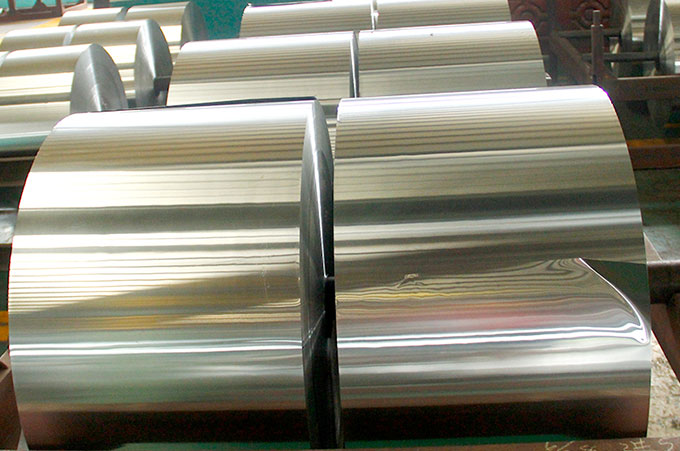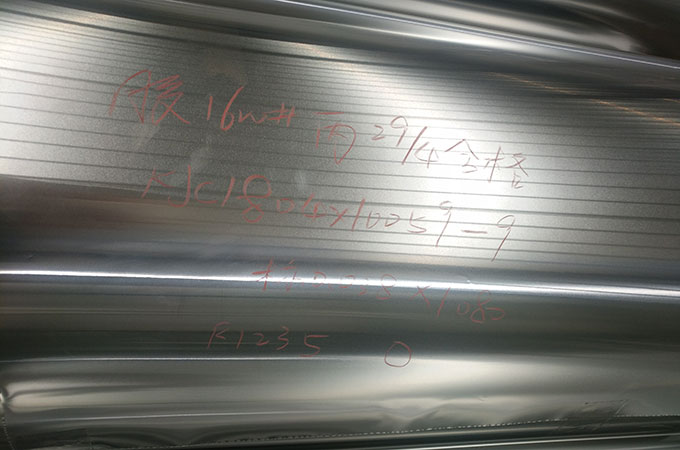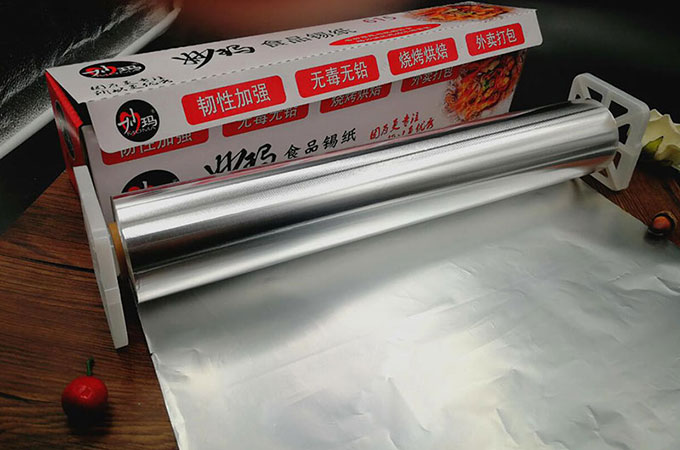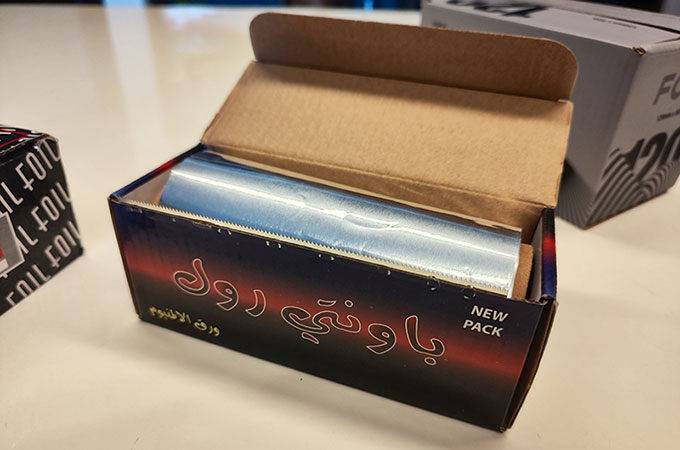Household aluminum foil is a common household product, also called aluminum foil plastic wrap, which is often used in cooking. Is It Safe to Cook With Aluminum Foil?
Some people think that during the cooking process of wrapping food with household aluminum foil (aluminum foil), aluminum elements will seep into the food due to high temperature, airtightness and other reasons, which will endanger your health, while some people think that using aluminum foil plastic wrap will not endanger your health. What do you think?
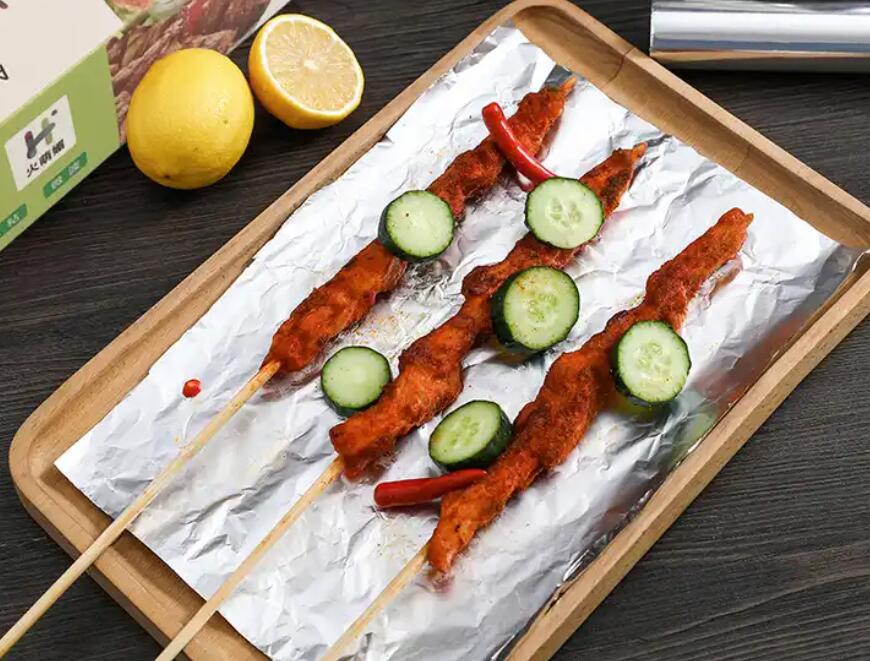
What is Household Aluminum Foil?
Household aluminum foil or tin foil is a thin, shiny sheet of metal. Thickness is less than 0.2mm. There are many uses for household aluminum foil, such as refrigeration, grilling, baking, and more. Widely used in restaurants, home kitchens, outdoor barbecues, etc.
Aluminum content in food and health
People use household aluminum foil to wrap food, whether in the home kitchen or outdoors, sometimes in order to prevent moisture loss and keep food fresh, sometimes use household aluminum foil to wrap food for cooking, such as toast, biscuits, etc., and sometimes use household aluminum foil to wrap food for barbecue.
The use of aluminum foil can freely arrange the food position, but also keep the food tidy, and at the same time, avoid the trouble of cleaning the oil stains on the kitchen utensils.
However, some people believe that cooking with household aluminum foil will cause aluminum to enter the human body and endanger health.
We know that aluminum is one of the most abundant metals on earth. We are full of aluminum elements, in the soil, in the air, in the cooking utensils, including our food, there are more or less aluminum elements, and the human body will also ingest a certain amount of aluminum elements.
The World Health Organization (WHO) and Food and Drug Administration (FDA) have agreed that levels below 2 mg per 2.2 lb (1 kg) of body weight per week are unlikely to cause health problems.
EFSA uses a more conservative estimate of 1 mg per 2.2 lb (1 kg) of body weight per week.
Under normal circumstances, there is very little aluminum that is actually absorbed, and most of the aluminum will be excreted with the body's metabolism. We do not have adverse symptoms due to intake of aluminum.
Wrapping food in aluminum foil for cooking may increase the amount of aluminum in the food due to a number of factors including:
- Temperature: Cook at a higher temperature
- Food: cooking acidic foods such as tomatoes, cabbage, etc.
- Seasoning: use vinegar, salt and spices in cooking
During cooking, the amount of aluminum that leaches into food varies from case to case.
Essam Zubaidy, a chemical engineering researcher at the American University of Sharjah, conducted a comprehensive study looking at the effects of aluminum on cooking, which can increase the aluminum content of food. However, the amount is so small that Essam Zubaidy considers it safe.
At the same time, Essam Zubaidy found that acidic dishes cooked in aluminum foil may double the aluminum content in food, and we should avoid using aluminum foil to wrap acidic food.
These studies have raised concerns that regular use of aluminum foil in cooking may be harmful to your health. However, there is currently no strong evidence that aluminum foil use increases disease risk.
Aluminum and Alzheimer's
Does Exposure or Intake of Aluminum Increase Your Chance of Alzheimer's Disease? For decades, researchers have been studying and trying to answer this thorny question.
Dr. Alex McDonald of Kaiser Medical Center in California believes that there is no clear answer to the question whether aluminum directly causes Alzheimer's disease. This controversy dates back to the 1960s.
The question of aluminum is that it will increase the risk of Alzheimer's disease, because the brains of Alzheimer's patients have high levels of aluminum, but the relationship between aluminum and Alzheimer's disease has not been determined, and there is no evidence that aluminum causes cancer.
So where does this statement come from?
Although exposure to low levels of aluminum in food and drinking water, cooking utensils, or cosmetics is considered unlikely to increase Alzheimer's disease risk, avoid unnecessary long-term exposure to chemicals in your life.
How to Minimize Your Exposure to Aluminum While Cooking
It's impossible to completely remove aluminum from your diet, but you can work to reduce it.
- Avoid high heat cooking: Cook food at lower temperatures whenever possible.
- Use less aluminum foil: Use less aluminum foil when cooking, especially with acidic foods like tomatoes or lemons.
- Use non-aluminum utensils: Use non-aluminum utensils for cooking, such as glass or porcelain flatware and utensils.
- Avoid mixing aluminum foil with acidic foods: Avoid exposing aluminum foil or cookware to acidic foods such as tomato sauce or rhubarb.
Also, because commercially processed foods can be packaged in aluminum or contain food additives that contain aluminium, they may have higher levels of aluminum than homemade foods.
Therefore, eating more homemade foods and reducing your intake of commercially processed foods may help reduce your aluminum intake.
Aluminum exposure can be reduced by reducing intake of highly processed foods and reducing use of aluminum foil and aluminum cookware.
Which foods cannot be wrapped in aluminum foil?
We all know that household aluminum foil can be used for baking, heating and refrigeration, but which foods are not recommended to be wrapped in aluminum foil?
First, leftovers
For most people, wrapping food in aluminum foil and tossing it in the freezer is a quick and easy way to store food. However, it's also easy to put yourself at health risk by wrapping those leftovers in aluminum foil.
Use aluminum foil to save leftovers, because it cannot be completely isolated from the air, it will nourish a lot of bacteria, we should keep food in airtight containers.
Second, acidic food
Acidic foods can lead to elevated aluminum levels in foods. Although there is no evidence that elevated aluminum levels can endanger our health, it is generally not recommended to wrap acidic foods such as lemons, tomatoes, vinegar, red meat, etc. in aluminum foil for a long time.
Which side of aluminum foil is safe to use
Household aluminum foil has two sides, one side is very shiny, and the other side is matte.
Many people think that both sides are the same when using tin foil for the first time, and it doesn't matter if you use it casually, but this is not the case.
When using tin foil, be aware that the matte side is for food contact, which means the matte side of the foil is non-stick.
If the food is wrapped with the shiny side, it is easy for the food to stick to the aluminum foil.
Should Aluminum Foil Be Stopped?
Household aluminum foil is not dangerous, it facilitates our cooking and can help us solve the trouble of cleaning tableware.
Although cooking with aluminum foil sometimes increases the aluminum content in food, the amount of aluminum absorbed by the human body does not increase due to the increase in aluminum content in food
Since the amount of aluminum you're likely to eat is much lower than what's considered safe, there's no need to remove aluminum foil from cooking.

